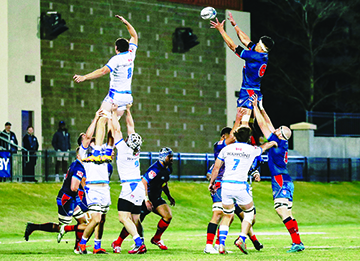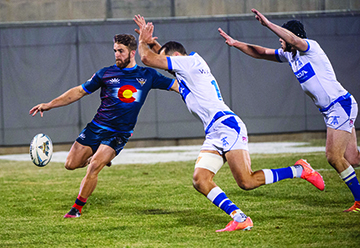by Laura Lieff
Elite competitors will have a new avenue to showcase their athletic talent. Taking place November 17 through 21, Glendale is hosting an invitation-only crossover camp that is designed to attract top athletes from non-rugby sports and teach them how to play rugby. The brainchild of Glendale’s Director of Rugby and Manager Mark Bullock, the crossover camp will focus on recruiting American athletes who could become star rugby players.

“The majority of elite athletes in the USA were playing university sports and then would go on to the NFL, NBA, NHL, or the Olympics for track and field, wrestling etc., if good enough,” Bullock explains. “The thought was, why not recruit those elite athletes to rugby once they have completed their university eligibility and/or were cut from professional teams.”
According to Bullock, other rugby teams are at the top of the world rankings because they have elite athletes playing for them. Conversely, the USA has done poorly in the Rugby World Cup over the years because the competitors have been good rugby players but not top athletes. He adds, “We want to change the equation. In the past, our top USA Men’s National Team players have all come from other sports.” By effectively converting elite athletes (who have previously been in scholarship university sports programs) into rugby players, Bullock hopes to mold them into World Cup-worthy competitors.
New Method Of Recruitment
For those unfamiliar with the rugby world, and to use pop culture as an example, the notion of an athlete crossing over from one sport to the other has historically gone well. In The Cutting Edge, a college hockey star trains hard and becomes a gold medal-winning Olympic figure skater and, in Cool Runnings, track runners work hard and become a competitive bobsled team. But in real life, some might question whether or not a former track star, or former hockey, basketball, or baseball player can turn into a competitive rugby player. Based on the trial camp Bullock ran in 2018, he is confident it will work.
“We trained for a week and then played in the Aspen Ruggerfest where we lost our first two matches but improved each game,” he remembers. “The last two matches we won quite readily as the players got better acquainted with the game, and how it is played, demonstrating that we can make the transition. Now our goal is to transition the players into a professional team to ultimately compete in a foreign competition and develop players for the USA National Team.”
In preparation for the crossover camp, Bullock and his staff created a database comprised of approximately 3,000 athletes from collegiate football, basketball, wrestling, track and field, along with players from the NFL, XFL, CFL, and other sports. Additionally, similar to Cool Runnings, Bullock and his staff have worked with the USA bobsled program and learned about how they recruited crossover athletes for their program. By researching university athletic program websites, coach contacts, NFL websites, and team sites, they were able to accumulate a comprehensive list of athletes and then watched video, spoke to coaches, and found methods to contact the players who fit their criteria.

Intriguing Sport
When asked whether these athletes are excited about rugby or if they know anything about the sport coming into the camp, Bullock says that so far, he has seen a mix. He explains, “Some have played, some have seen the sport, and others have just heard of it. One example is a wrestler, who recently graduated from Stanford, told us he was intrigued by the sport and really liked the ‘pile of guys in the middle,’ referring to a scrum. And he wanted to be right in the middle of it.”
Another example comes straight from the Glendale coaching staff. Defense Coach and Director of Amateur Rugby Luke Gross was a Division One basketball player on scholarship at Marshall University and was randomly asked to play rugby while he was a graduate student. He accepted the offer and within a year he was on the USA National Team, earned a contract to play professionally in Europe, and ultimately played 12 years as a professional rugby player in England, Wales, and Italy.
Talent Goes A Long Way
Overall, Bullock’s goal for the crossover camp is to offer players professional contracts following the camp, and for these players to develop to the point where they are able to represent the USA and make the team a contender at the Rugby World Cup. He says he expects a minimum of 40 athletes to attend the camp and contract offers will depend on performance during the camp.
“This is an experiment and we have a hypothesis that we can convert crossover elite athletes to become a high-performing rugby team,” Bullock explains. “Not all hypotheses work out 100 percent but we will adjust and learn along the way, just as the athletes we will be introducing to the game will learn.”
Photo by Seth McConnell
